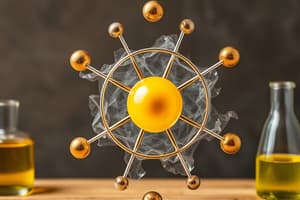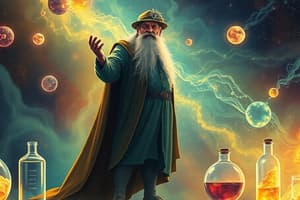Podcast
Questions and Answers
What did Democritus reason about atoms?
What did Democritus reason about atoms?
Atoms were indivisible and indestructible.
What is an atom?
What is an atom?
The smallest particle of an element that retains its identity in a chemical reaction.
Who transformed Democritus' ideas on atoms into a scientific theory?
Who transformed Democritus' ideas on atoms into a scientific theory?
Dalton.
What does Dalton's first atomic theory state?
What does Dalton's first atomic theory state?
What does Dalton's second atomic theory state?
What does Dalton's second atomic theory state?
What does Dalton's third atomic theory state?
What does Dalton's third atomic theory state?
What does Dalton's fourth atomic theory state?
What does Dalton's fourth atomic theory state?
What are electrons?
What are electrons?
What was the experiment performed by Thomson?
What was the experiment performed by Thomson?
What was the outcome of Thomson's experiment?
What was the outcome of Thomson's experiment?
Who carried out the oil drop experiment?
Who carried out the oil drop experiment?
What is the charge of an electron?
What is the charge of an electron?
What is the mass of an electron?
What is the mass of an electron?
What is the charge of a proton?
What is the charge of a proton?
What is the charge of a neutron?
What is the charge of a neutron?
What discovery is associated with Thomson?
What discovery is associated with Thomson?
What is the Thomson model of the atom known as?
What is the Thomson model of the atom known as?
What was Rutherford's significant experiment?
What was Rutherford's significant experiment?
What is the nucleus of an atom?
What is the nucleus of an atom?
What does the nuclear atom model suggest?
What does the nuclear atom model suggest?
How are elements different from each other?
How are elements different from each other?
What is the atomic number?
What is the atomic number?
What is the mass number?
What is the mass number?
What are isotopes?
What are isotopes?
Why do isotopes have different mass numbers?
Why do isotopes have different mass numbers?
What is an atomic mass unit (amu)?
What is an atomic mass unit (amu)?
What is the definition of atomic mass?
What is the definition of atomic mass?
How do you calculate atomic mass?
How do you calculate atomic mass?
Flashcards are hidden until you start studying
Study Notes
Democritus and Atomic Theory
- Democritus proposed that atoms are indivisible and indestructible, laying the groundwork for atomic theory.
- John Dalton expanded on Democritus' ideas, formulating Dalton's Atomic Theory, which consists of several key postulates.
Dalton's Atomic Theory
- All elements are made of tiny indivisible particles called atoms.
- Atoms of the same element are identical, while atoms of different elements differ.
- Atoms can mix physically or combine chemically in simple whole-number ratios to form compounds.
- Chemical reactions involve the separation, joining, or rearrangement of atoms.
Subatomic Particles
- Electrons are negatively charged subatomic particles, fundamental to atomic structure.
- Protons carry a positive charge, while neutrons have no charge.
Historical Experiments
- J.J. Thomson conducted cathode ray experiments, revealing the existence of electrons, leading to his plum pudding model of atomic structure.
- Robert A. Millikan's oil drop experiment determined the charge of an electron as one unit of negative charge.
Atomic Structure
- The nucleus is the atom's dense central core, composed of protons and neutrons.
- A nuclear atom has a positively charged nucleus with electrons distributed around it, constituting most of the atom's volume.
Atomic Identity
- The atomic number signifies the number of protons in an element and determines its uniqueness.
- Mass number is the total number of protons and neutrons in an atom's nucleus.
- Isotopes are variants of the same element with identical proton counts but different neutron counts, resulting in varied mass numbers.
Atomic Mass
- Atomic mass unit (amu) represents 1/12 of the mass of a carbon atom.
- Atomic mass is the weighted average mass of an element's isotopes based on their natural abundance.
- To calculate atomic mass, multiply the mass of each isotope by its natural abundance and sum the results.
Studying That Suits You
Use AI to generate personalized quizzes and flashcards to suit your learning preferences.




